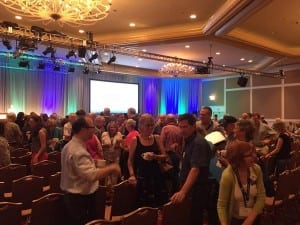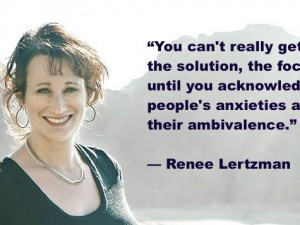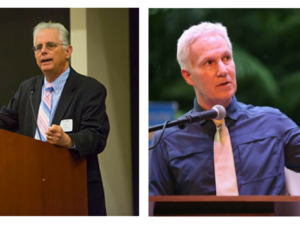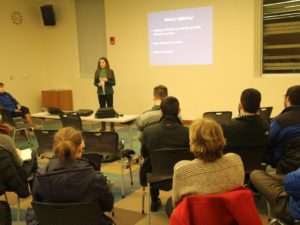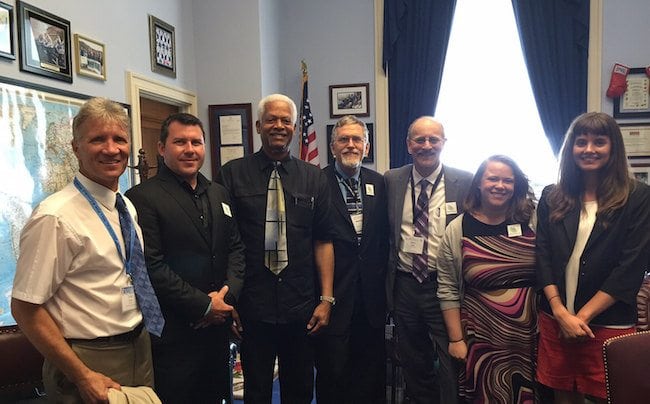
CCL volunteers from Atlanta meet with Rep. Hank Johnson (third from left) during a lobby day in Washington.
By Dave Christian, Ph.D.
Climate science confirms that climate change is real, man-made, and serious. At CCL, we are often exasperated with those who deny or ignore the preponderance of scientific evidence on this matter. However, lobbyists are often unaware of the scientific evidence that points to best lobbying practices. Motivational Interviewing (MI) offers scientifically supported tools for expanding common ground and partnering with others for change. With 30 years of refinement and over 1,200 published studies demonstrating its effectiveness, MI offers the most robust partnering skills available.
As a clinical psychologist, I use MI every day to help my clients make the changes they desire. My first experience with MI was during my internship at a large VA hospital. I was tasked with developing a program to help vets who were struggling with substance abuse. Most substance abusers struggle with ambivalence; part of them wants to continue the addiction, and a part of them wants to quit abusing. MI is designed to help break this gridlock of ambivalence, tilting the balance in favor of change. MI helped our patients break free of ambivalence and move into recovery. Other hospital departments caught wind of MI’s power to promote change. Soon I was training physicians and interns how to use it to help their own patients.
Many of those we lobby are ambivalent about supporting carbon fee and dividend legislation. It is easy to believe such individuals are ignorant, malicious, backward, or selfish. This attitude compels us to correct or persuade. Sadly, this approach triggers resistance.
MI transcends the adversarial mindset. It taps into others’ values rather than working against them and paradoxically, it encourages THEM to make the case for change. Seems impossible? Here’s how it works.
The spirit of MI: PACE
Partnership of Equals: This is how we see our relationship with them.
Acceptance: We show empathy and respect for their autonomy.
Compassion: We show genuine caring for them.
Evocation: We use THEIR wisdom to make the case for change.
The Four Processes
Engage: We establish a working partnership.
Focus: We clarify our mutual agenda.
Evoke: We elicit THEIR reasons for change.
Plan: We move them toward a committed plan of action.
The Core Skills: OARS
Open-ended questions deepen our dialogue.
Affirmations of their positive actions deepen rapport.
Reflective listening shows we understand their position.
Summaries capture progress and confirm direction.
Evoke Change Talk (DARN CAT)
We Selectively ask about and reflect the following:
Desire: Their wants and desires for change.
Ability: Their abilities, skills and resources for change.
Reasons: Their reasons to change.
Need: Their need to change.
Commitment: What they say they will do, their commitment to change.
Activation: Their willingness and preparedness to start the change.
Taking Steps: Steps they have taken or are taking in the desired direction.
A quick story illustrates the power of MI. A few years ago, I and my local CCL delegation were lobbying our congressman, Rob Bishop. After my three companions (all science professors) shared impressive statistical evidence for carbon fee and dividend, Mr. Bishop appeared to struggle to remain polite as he stared at us with arms crossed. It was time to try MI. Using OARS, we asked him about his personal interest in climate solutions. The mood shifted. He opened up about his recent meeting with President Obama. By the end of our meeting he was affable, smiling, and accepted our offer of a copy of the REMI report with willingness to follow up on it. The climate in the room switched from chilly to pleasantly warm. Using MI principals makes a big difference.
Opportunities to learn Motivational Interviewing
A special 90-minute Citizens’ Climate University webinar will be held at 8 p.m. ET on Thursday, April 20, online or by phone: 408.638.0968 (US Toll) or 1.855.880.1246 (US Toll Free) and enter 2017-2017-17 as the meeting ID when prompted.
Those who are attending the CCL conference in Washington can take the workshop there.
Dr. David Christian is a psychologist and a member of the Cache Valley, Utah, CCL chapter. He is a certified trainer in Motivational Interviewing.

